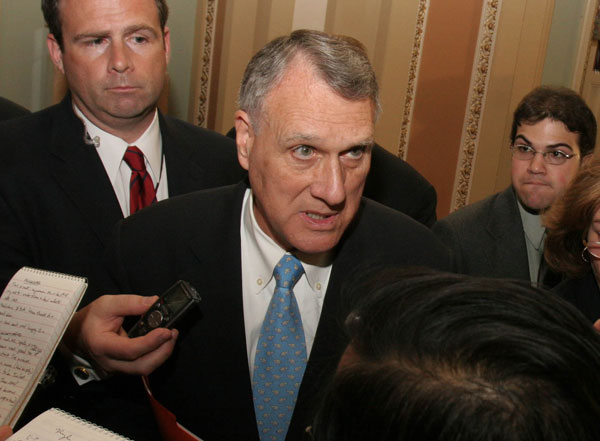Arizona’s Go-To Senator « The Washington Independent
Jul 31, 202015K Shares682.3K Views
Sen. Jon Kyl (R-Ariz.)(WDCpix)
PHOENIX, Ariz.–When Arizona’s business leaders need Congress to act, they don’t go to the Republican presumptive presidential nominee Sen. John McCain.
Instead, for complicated issues that require a proven ability to reach political consensus, patience and attention to detail, Arizona’s leaders often seek out the state’s junior senator, Republican Jon Kyl. While McCain has been in the national spotlight for more than a decade, focusing on broad issues, Arizona leaders know that he tends to brush aside state issues and condemn earmarks, even for needed local projects. Kyl, meanwhile, has regularly accomplished the heavy lifting on legislation that is honed to state needs.
Illustration by: Matt Mahurin
Kyl continues the tradition of focusing first on the needs of the state set by his predecessor, Democrat Dennis DeConcini. During his years in the Senate, DeConcini served in the long shadow of another Republican national leader and presidential nominee, Sen. Barry M. Goldwater.
“From the Arizona business community’s perspective, if you need something done in Congress the guy to go is Sen. Jon Kyl,” said Chuck Coughlin, a prominent Arizona lobbyist and political consultant. “His staff and he will spend the time and attention to address the issues.”
Coughlin, who managed McCain’s 2000 Arizona presidential primary campaign, said McCain’s “career has been more focused on national issues, foreign relations, national-security issues — issues that effect the country as a whole rather than just an issue that is pertinent to Arizona.”
Last November, Kyl, a hard-line conservative, was elected assistant Senate Republican leader, culminating years of behind-the scenes work and shrewd diplomacy. Depending on the outcome of the presidential race, Kyl may eclipse McCain as the most powerful legislator from Arizona. Then again, if McCain wins the White House, Arizona will be in enviable position — with two native sons in powerful posts.
Phoenix Democratic political analyst Barry Dill said the state-focused roles adopted by DeConcini and Kyl are more a function of their personalities than the fact the state’s senior senator at the time are men who ran for president. “Both DeConcini and Kyl are detailed-oriented and like the minutia of legislating and the legilsative process,” Dill said. “Goldwater and McCain weren’t or aren’t as enamored with the process of legislation as they were and are, with the bigger global picture.”
Like DeConcini before him, Dill said Kyl has earned a reputation of a studious legislator who puts in the long hours necessary to pass difficult legislation, and does not seek the media attention that helped turn Goldwater and McCain into national political figures. “I believe both Kyl and DeConcini fall in the workhorse categatory rather than the showhorse category,” said Dill, who ran DeConcini’s state office in the 1990s.
Kyl, 66, sits on the Senate Judiciary Committee and is said to have played a key role in undermining President George W. Bush’s nomination of Harriett Miers to the Supreme Court. Kyl is also a member of the Senate Finance Committee, where he’s considered an expert in the intricacies of public finance. A well-known hawk, Kyl is the honorary co-chairman, along with Sen. Joseph Lieberman (I-Conn.), and former Secretary of State George Shultz, for the Committee of Present Danger, a Cold War-era anti-communist group revived in 2004. The committee says one of its goals is “to stiffen American resolve to confront the challenge presented by terrorism and the ideologies that drive it.”
Kyl has dedicated much of his Senate career to addressing complex issues that have profound effect on Arizona’s economy and future development. These are the essential elements of life for most Western states — water, public lands, Native Americans and rural economic development. The most important state issue Kyl has untangled involves Indian water-rights settlements. In many cases, disputes over Indian water-rights claims have dragged on for most of the 20th Century.
Kyl was instrumental in reaching a 2004 comprehensive water-rights settlement agreement with several Arizona Indian tribes, giving them control of 47 percent of Arizona’s share of Colorado River water diverted by the Central Arizona Project canal.The tribes will lease the water back to growing municipalities, generating hundreds of millions of dollars in revenue for reservations mired in poverty for more than 100 years. McCain joined Kyl as a co-sponsor of the Arizona Water Settlements Act of 2004, but it was Kyl who hammered out the complicated and often contentious bill.
“That was huge deal,” Coughlin said of Kyl’s persistence in passing the bill. “Trying to bring everybody together in that deal was equivalent to negotiating the Israeli-Palestinian peace process.”
McCain, Coughlin said, generally has not been focused on dealing with complex issues that effect Arizona. “John McCain has, with a few exceptions, not had the staying power to be involved and invest the time and energy that it takes to resolve really sticky issues in Arizona,” Coughlin said.
One recent exception, Coughlin said, was McCain’s work to secure funding to buy land around Luke Air Force Base, ensuring a buffer zone between the base and the rapidly expanding communities west of Phoenix. But this was more than a local issue. The Luke base trains fighter pilots who use the Barry Goldwater Gunnery Range, to the southwest, for practice. Securing land around the base for an accident protection zone was, Coughlin said, “an issue of national security.”
The deal has been criticized, however, because it involved the state’s largest utility, Pinnacle West Capital Corp., one of McCain’s major campaign contributors. The government paid Pinnacle West’s subsidiary, SunCor, twice the military’s appraised value for 122 acres, according to USA Today.
While McCain and Kyl have sharply contrasting styles, Time Magazinein 2006 included both men in its list of the top 10 U.S. senators.
Kyl, Time noted, “has succeeded by mastering a tactic that is crucial in a body in which any one member can bring the place to a halt as a ploy or out of pique: subterfuge.” Calling Kyl “The Operator,” Time said Kyl knows how to stay in the background and then step forward to attain his goals. “You can accomplish a lot if you’re not necessarily out in front on everything,” Kyl told Time.
Time dubbed McCain “The Mainstreamer” for his “rare ability to put an issue on the U.S. agenda that wouldn’t naturally be there.” Time noted that McCain’s military background and years as a POW gives him a bully-pulpit few senators can match. “McCain has earned that moral authority over the years by being patient and making the big play,” Time said. “Many of the problems McCain tackles are entrenched and unexciting: they challenge the rules in Washington and the cynicism of voters at home.”
The contrasting styles of McCain and Kyl are reflected in the major contributors to their senatorial campaigns. In McCain’s 2004 senate campaign, four of his five top contributors were companies outside Arizona, according to Opensecrets.org. McCain’s top out-of-Arizona contributors included Goldman Sachs with $92,865, Merrill Lynch at $73,150, Viacom Inc. with $65,804 and Microsoft Corp. at $54,349. The only major contributor with direct ties to Arizona was Qwest Communications, with $69,100. While Qwest is a major telecommunications provider in Arizona, the company is based in Denver.
Four out of five of Kyl’s contributors to his 2006 senate campaign, meanwhile, had major operations in Arizona. Kyl faced a strong challenge from Democratic developer Jim Pederson, who spent more than $10.9 million of his own money on the campaign. Kyl defeated Pederson by a 53 percent to 44 percent margin to win this third term.
Kyl’s major contributors included Phoenix-based Viad Corp., with $61,800; the Phoenix law firm of Snell & Wilmer with $56,6500; the law firm of Squire, Sanders & Dempsey, which maintains a large office in Phoenix, with $55,250 and Pinnacle West, with $42,500. Kyl’s biggest supporter came from the conservative economic advocacy group, the Club for Growth, with $155,753.
The Club for Growth’s strong support is based on Kyl’s conservative voting record and consistent support for tax cuts and reduced spending, said club spokeswoman Nachama Soloveichik. While the Club for Growth holds Kyl in high esteem, it is far more wary of McCain — whose failure to support the Bush tax cuts hurt his credibility with conservatives.
The Club for Growth sharply criticized McCain late last month when he stated that, if he were president, everything would be on the table concerning Social Security reform — suggesting a tax increase was possible. McCain responded to the criticism later, stating he would not support a tax hike.
Such political wavering has never been a problem for Kyl, who always takes solidly conservative stands.
“Sen. Kyl does not have any of these issues on his record,” Soloveichik said. “McCain has a great record on some things but he also occasionally has a habit of kicking off some conservatives. Sen. Kyl is just great across the board.”

Hajra Shannon
Reviewer
Latest Articles
Popular Articles

